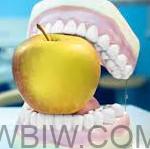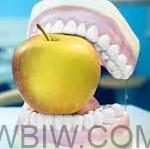
BLOOMINGTON – Dentures may have a potentially negative impact on a person’s overall nutrition, according to new research from the Regenstrief Institute and Indiana University School of Dentistry.

The research team used electronic dental and health records to gain a better understanding of how oral health treatments affect individuals’ overall health over time.
Dentures don’t provide the same chewing efficiency as teeth do, and this may alter eating habits, says Dr. Thankam Thyvalikakath of IU and Regenstrief. It’s important that dentists are aware of this to provide advice or a referral for nutrition counseling, she says.

Also, patients should report to their dentists if they experience any problems with their dentures, such as damage or improper fit that compromises chewing efficiency.

For the study, the research team matched the dental records of more than 10,000 patients in Indiana with medical laboratory data and specific markers for malnutrition. The laboratory tests included complete blood count, basic metabolic profile, and lipid and thyroid panel tests, among others.
They compared the lab results from two years before a patient received dentures to two years after. Researchers found that people with dentures had a significant decline in certain nutrition markers during those two years.
People who did not wear dentures did not experience this decline. The marker levels were still within the normal range, but researchers say there is the potential that the levels will continue to fall as more time passes.
The results also highlight the importance of maintaining good oral health and preventing tooth loss to maintain optimum nutrition. The researchers will next explore other factors that may influence nutrition, including insurance status and patient characteristics.
Information: Indiana University Research Impact



